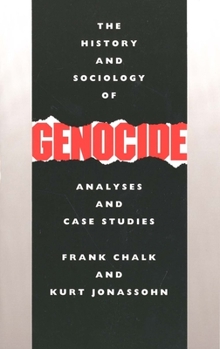The History and Sociology of Genocide: Analyses and Case Studies
Select Format
Select Condition 
Book Overview
Genocide is not an invention of the twentieth-century, say Frank Chalk and Kurt Jonassohn in this absorbing book, but has occurred throughout history in all parts of the world. This study--the first comprehensive survey of the history and sociology of genocide--presents over two dozen examples of the one-sided mass slaughter of peoples, spanning the centuries from antiquity to the present. By including political and social groups as potential victims, Chalk and Jonassohn provide a definition of genocide that is considerably broader than that contained in the United Nations Convention on Genocide. They present a typology of genocide according to the motives of the perpetrator: to eliminate a perceived threat; to spread terror among real or potential enemies; to acquire economic wealth; or to implement a belief, theory, or ideology. Chalk and Jonassohn show how the first three motives have played a role in the establishment and maintenance of empires. They note that since empires have almost disappeared, so have these three types of genocides become rare, and that ideological genocides have become the most important type of genocide in the twentieth-century. The second part of the book consists of selected studies. These include Rome's final war with Carthage, the Mongol Conquests, the Albigensian Crusades, the Great Witch-Hunt, Christians in Japan, Indians in the Americas, Ndwandwe under Shaka Zulu, Hereros in German South West Africa, Armenians in Turkey, the Soviet Union under Stalin, the Holocaust, Indonesia, Bangladesh, Burundi, and Cambodia, among others. The last part of the book presents topical bibliographies to aid the student and researcher.
Format:Paperback
Language:English
ISBN:0300044461
ISBN13:9780300044461
Release Date:September 1990
Publisher:Yale University Press
Length:480 Pages
Weight:1.55 lbs.
Dimensions:1.3" x 6.1" x 9.2"
Customer Reviews
2 ratings
Genocide not the solution
Published by Thriftbooks.com User , 14 years ago
The book is an excellent presentation of genocide through history, but it does not deal with cases of genocide where the uprooting or indigenous population is done through a policy of long-term attrition designed to change the demographic structure of a geographical space by the implementation of policies whose purpose-by making their life miserable through confiscation of landm desroying social strucures, hampering free circulation and propaganda deshumanizing them, deligimitmizing political revendicationsm etc.is to force the local population to empty the country. A state in the middle east has been particularly successfull in the emplemetation of this policiy for the last 62 yearsm with the unconditional military and political support of all the great democraties in the world. But censorshipm however water-proof it is will not do the job of totally suppressing the legitimate rights of the original people, even if the other party claims a divine right to this country.
Our evil side
Published by Thriftbooks.com User , 21 years ago
This anthology begins with an analysis of genocide, specifically how the authors/editors defined it and decided which historical acts were genocidal and which were not. It the includes readings covering 1,000 years of gruesome history. More a souce book than an analytical monograph.






